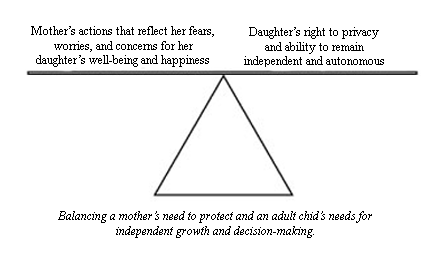Understanding the Smothering Mother
Roni Cohen-Sandler, Ph.D., uses the term "Monster Mothers." These are women who are abusive, neglectful, and intolerable of a daughter's individuality. They fail to be empathetic during teen years and are uncommunicative because they cannot express themselves. Fortunately, they are the exception to most mothers rather than the rule.
Woman to Woman
Dr. Hiasako M. Koizumi, associate professor of child and adolescent psychiatry at Ohio State University, explains that a true overprotective mom interferes with normal child development. She manages their environment to the extent that she prevents them from learning how to handle stress, inhibits healthy exploration, denies the growth of autonomy, limits self-confidence, and nurtures socially isolated and inadequate teenagers.
Everyone has a name for these moms. However, the one that is universally understood is " overprotective." She will hide behind bushes to make sure her children walk safely into the school building and double-check their homework to ensure passing grades.
The name, overprotective mom, conjures up a character. The comical, exaggerated image is one of a mother who will follow her kids anywhere, from the bathroom to college, and wipe their teenage noses as if they were toddlers.
The point is, you won't find a mom in the world who doesn't possess some degree of zealous enthusiasm for protecting her children. But that doesn't constitute smothering. The concept of motherly protection is so important that it merits a separate discussion.
Legitimizing the Need to Protect
Most women view protection of their daughters as a form of nurturing, not controlling! Keeping children safe—and we all know that your daughter is your child for life—is a major concern for moms. The anxiety over protecting daughters from school violence, abductions, and gun-toting youngsters merely changes focus in adulthood to college acceptances, broken hearts, fertility, career disappointments, and marital or singlehood happiness.
"It is hard for parents to do less and still feel they are doing a good job," said Janis Keyers, M.A., faculty member in human development at Carillo College and author (Becoming the Parent You Want to Be, Broadway Books, 1997).
The tricky part for well-meaning moms at any stage is to promote a balance between exploration and a safe environment without putting obstacles in the way for an autonomous, self-directed life.
Controlling the Urge to Protect
It is wise for each parent to consider her own actions and determine their motivation for decisions says Dr. Hiasako M. Koizumi. The number one question moms need to ask themselves is, "Am I doing this because of my own anxiety or is there a real and justified concern for my daughter's safety, happiness and well-being?"
A rule of thumb Koizumi suggests is arriving at a balance that promotes safety but allows growth in younger years. The same is true in adulthood with some conceptual adjustments. This diagram visually depicts the concern that must be balanced between a protective mother and her daughter during adulthood.
